Star Trek: Enterprise Second Season
Original air dates: September 2002 – May 2003
Executive Producers: Rick Berman, Brannon Braga
Captain’s log. Archer manages to rescue himself from the future, with help from T’Pol, and presumably fix the dystopian future he and Daniels were trapped in. Aside from finding a time-displaced ship, that’s the last we hear of the Temporal Cold War until the season’s end, when Future Guy and the Suliban (the name of my next band) provide necessary exposition to Archer and the gang about the attack on Earth.
Between those two are a series of adventures. They have their first encounters with Romulans and Tholians, they get trapped by a repair station that’s too good to be true, they have difficult new encounters with Klingons and Kreetassans, and they deal with issues involving Earth Cargo Ships and leftover Borg.
Past encounters with Vulcans are revisited, including T’Pol being telepathically raped, which has dire consequences both biologically and sociologically; a mission from T’Pol’s past coming back to haunt her; and the ongoing Andorian-Vulcan conflict, which Archer winds up thrust into the middle of. Archer also finds himself imprisoned on no fewer than three occasions: once by mistake while making first contact with the Enolians, once by the Klingons who accuse him of consorting with rebels against the empire, and once by a Tellarite bounty hunter who wants to turn him into the Klingons after he escaped the latter’s imprisonment.
We get a couple of flashbacks, including to T’Pol’s ancestor who lived on Earth for a time in the twentieth century, to everyone’s surprise, and Archer and Tucker’s first meeting during the early days of the Warp Five Project.
Plus, they make several first contacts besides the aforementioned Romulans, Tholians, and Enolians: the Retellians and Kriosians, the Takret, the Arkonians, the Vissians, the wisps, and the people on the planet where Reed left a communicator behind that the writers couldn’t be bothered to name.
At the end of the season, Earth is attacked by a mysterious probe, and the finale closes with Enterprise entering the Delphic Expanse in search of those responsible, thus setting the next season up…
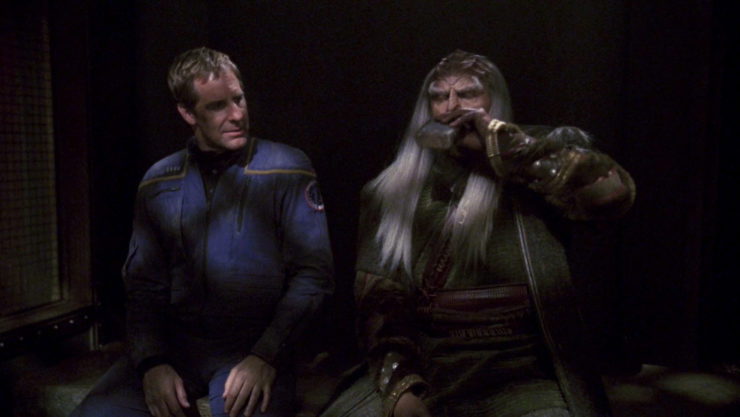
Highest-rated episode: “Judgment,” the first Enterprise episode to be ranked at 10.
Lowest-rated episode: “A Night in Sickbay,” the first Enterprise episode to be ranked at 0.
Most comments (as of this writing): “Carbon Creek,” with 64. Apparently talking about Pennsylvania in 1957 is more compelling than talking about deep space in 2153…
Fewest comments (as of this writing): A tie between “Canamar” and “The Catwalk,” both with only 21.
Favorite Can’t we just reverse the polarity? From “Future Tense”: When examining a strange pod that they can’t get any readings on until they open it, Archer, T’Pol, and Reed are remarkably cavalier and unsafe with doing so, as are Tucker and Reed later: they don’t wear any kind of protective gear, they open the hatch and hope that there’s no poisons or contagions inside (seriously, when we got to Archer opening the hatch and shoving his head in to smell it, I was flashing to the scene in Galaxy Quest where Guy cries out, “Is there air? You don’t know!”), and then they fondle all the stuff inside.
Favorite The gazelle speech: From “Shockwave, Part II”: This is the episode from which this section title comes from. Archer talks about how gazelles are born and immediately run with the herd flawlessly, but humans aren’t like that, and they need to stumble. It’s, um—not the best metaphor…
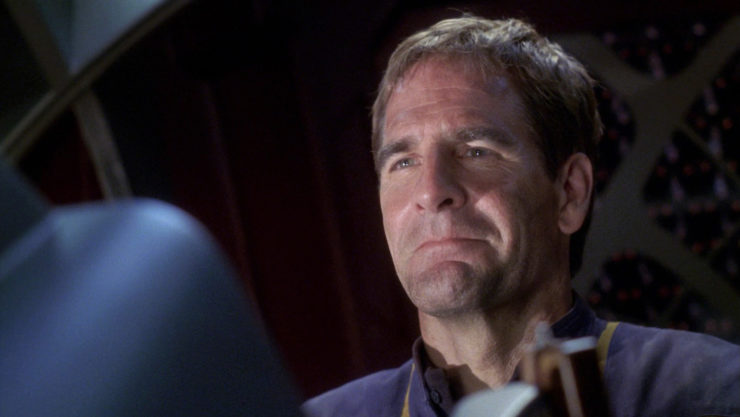
Favorite I’ve been trained to tolerate offensive situations: From “Singularity”: T’Pol’s usual role as the ship’s only grownup is taken to its absurdist extreme in this episode, as she’s the only one unaffected by the singularity.
Favorite Florida Man: From “Precious Cargo”: Florida Man Kidnapped With Alien Princess!
Favorite Optimism, Captain! From “Horizon”: Phlox has sufficient medical ethics that he won’t make up an illness to help T’Pol get out of Movie Night. He also has insufficient human social skills to realize that you shouldn’t talk during the movie…
Favorite Ambassador Pointy: From “Shockwave, Part II”: Soval stands by his insistence that Enterprise’s mission should be recalled, his primary evidence being the number of armed conflicts they’ve gotten into in general and their actions leading to the destruction of the monastery on P’Jem and freeing of 89 Suliban in particular. When T’Pol reminds him of the illegal listening post on P’Jem, he storms out of the meeting.
Favorite Good boy, Porthos! From “A Night in Sickbay”: Poor Porthos gets rubbed in decon gel, gets sick from an alien pathogen, gets a weird transplant, and has to put up with his human being a douchenozzle. Oh, and be replaced by the world’s most unconvincing puppy double for the surgery scene.
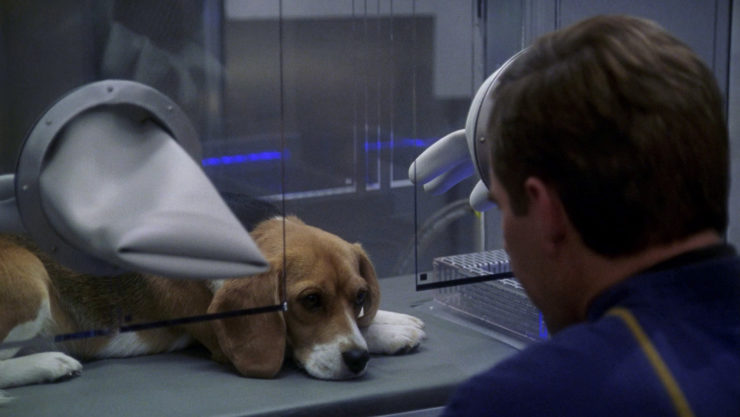
Favorite The Vulcan Science Directorate has determined… From “The Seventh”: Vulcan helped Agaron take down criminal elements that were dominating the planet with a very large number of deep-cover agents, nineteen of whom went native, which doesn’t speak particularly well of how they train their agents…
Favorite Qapla’! From “Judgment”: We learn in this episode that the warrior caste has the greatest status in the empire—which remains true for the next two centuries—but that it wasn’t always like that, and that Klingons used to value other professions more than they do now, but these days it’s all warriors this and soldiers that. These kids today, with their music and their hair…
Favorite Blue meanies: From “Cease Fire”: There is a faction of Andorians—represented by Tarah—that wants all-out war with Vulcan. Luckily, Shran is one of the cooler heads that prevails.
Favorite No sex, please, we’re Starfleet: From “Precious Cargo”: When Tucker first sees Kaitaama in stasis, he drools pretty openly over how hawt she is. His attraction lessens when she introduces herself by hitting him over the head. But they wind up knocking boots after they crash land, because of course they do.
Favorite More on this later… From “Vanishing Point”: Sato’s transporter-phobia will later be seen in other characters (with way less justification), including Leonard McCoy, Katherine Pulaski, and Reginald Barclay. Sato’s complaints about having her molecules scrambled are similar in nature, if not in tone, to those of McCoy’s in particular, while her having hallucinations while in the matter stream is similar to what happens to Barclay in TNG’s “Realm of Fear.”
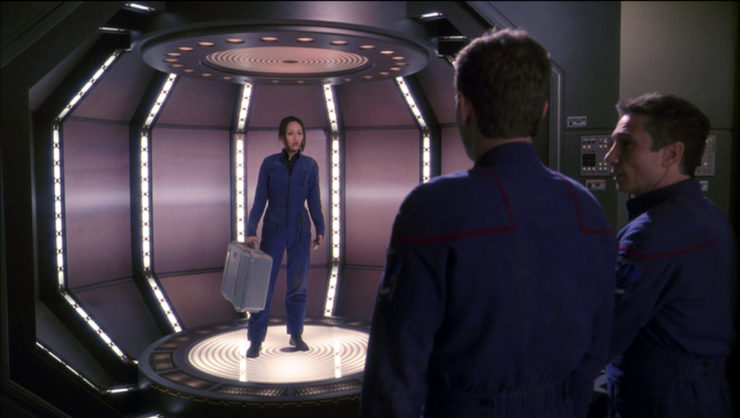
Favorite Welcome aboard: We’ve got a mess of recurring characters: Vaughn Armstrong as Forrest (and also as a Kreetassan in “A Night in Sickbay”), Jeffrey Combs as Shran, Jim Fitzpatrck as Williams, John Fleck as Silik, Gary Graham as Soval, James Horan as “Future Guy,” Matthew Kaminsky as Cunningham, Daniel Riordan as Duras, Joseph Will as Rostov, and Matt Winston as Daniels.
Some Trek veterans show up for return engagements, including J. Paul Boehmer (“Carbon Creek”), Scott Burkholder (“The Catwalk”), Michael Canavan (“First Flight”), Dennis Cockrum (“The Communicator”), Brian Cousins (“The Catwalk”), Michael Crawic (“Carbon Creek”), Leland Crooke (“Precious Cargo”), the great Bruce Davison (“The Seventh”), Robertson Dean (“Marauders”), Michael Ensign (“Stigma”), Nicole Forester (“Horizon”), Danny Goldring (“The Catwalk”), Brad Greenquist (“Dawn”), Francis Guinan (“The Communicator”), Jeffrey Hayenga (“Stigma”), Bari Hochwald (“Marauders”), Laura Interval (“Cogenitor”), the late great Andreas Katsulas (“Cogenitor”), Tim Kelleher (“The Communicator”), Scott Klace (“Precious Cargo”), Jordan Lund (“Bounty”), Aaron Lustig (“The Catwalk”), Morgan H. Margolis (“Vanishing Point”), Larry Nydrom (“Marauders”), Robert O’Reilly (“Bounty”), the great Suzie Plakson (“Cease Fire”), F.J. Rio (“Cogenitor”), Mark Rolston (“Canamar”), David Selburg (“Carbon Creek”), Christopher Shea (“Cease Fire”), Bruce Wright (“The Expanse”), and Keone Young (“Vanishing Point”).
Some other nifty guests include both Ann Cusack and Hank Harris as 1957 humans in “Carbon Creek,” Gregg Henry as an alien stuck with Tucker in “Dawn,” Melinda Page Hamilton as one of Phlox’s wives in “Stigma,” Sean Whelan as a really annoying fellow prisoner in “Canamar,” Joan Pringle and Corey Mendell Parker as Mayweather’s Mom and brother in “Horizon,” Mark Chaet, Laura Putney, and D.C. Douglas as three ornery Denobulan geologists in “The Breach,” Bonita Friedericy, John Short, and Chris Wynne as three human scientists in “Regeneration,” Keith Carradine as a fellow Starfleet captain and Brigid Brannagh as a bartender in “First Flight,” Ed O’Ross as a Tellarite in “Bounty,” and Josh Cruze as a Starfleet captain in “The Expanse.”
But the all-time winner for the season is the trifecta of awesome voices that play Klingons in “Judgment”: John Vickery as Orak, Granville Van Dusen as the magistrate, and especially the great J.G. Hertzler as Kolos.
Favorite I’ve got faith… From “The Catwalk”:
“You knew we’d be stuck in here for over a week. You might have given a little thought to making it tolerable.”
“I only had four hours, Malcolm—you’re lucky we’ve got a toilet.”
–Reed pissing and moaning and Tucker refusing delivery of same.
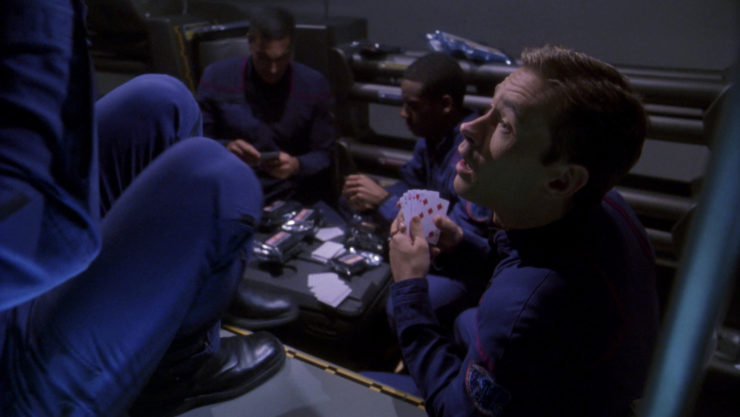
Favorite Trivial matter: It’s gotta be the one for “Judgment,” especially given the number of Easter eggs David A. Goodman put in his script, though the one for “Horizon” deserves honorable mention for all its callbacks and for my nerdity on the subject of Frankenstein.
It’s been a long road… “Weight of the world, Trip.” Where the first season was mediocre but at least showed some promise, the second season did an impressive job of being even more mediocre and fulfilling almost none of that promise.
The two big recurring elements of season one were the Vulcan-Andorian conflict and the Temporal Cold War. The former was only really seen once, in the excellent “Cease Fire.” The latter was only poked at occasionally, and managed to be even more nonsensical than it was in the inaugural season, which is no mean feat. Other than that, it was a bunch of standalone sci-fi episodes that were only distinguishable from TNG and Voyager in that the technology of Archer’s crew was slightly lesser than it was for Picard’s or Janeway’s.
Some of those stories worked nicely, mind you, but even many of those had a weird feeling of inconsequentiality. For example, “Minefield” was a good bit of suspense, but the fact that it was the first contact with the Romulans felt almost muted, while “Regeneration” was a strong action story, but the need to keep information about the Borg minimal kneecapped the episode in many of the same ways as “Acquisition” (though “Regeneration” was actually a good episode). Others were decent concepts that were just horrendously executed (e.g., “Marauders,” “Dead Stop,” “The Communicator,” “Stigma,” “Vanishing Point,” “The Crossing”). And some were just awful from the ground up and from the roof on down the other side, like “Precious Cargo” and “A Night in Sickbay.”
Having said that, the season also had some high points, including one of the franchise’s best Klingon episodes in “Judgment” and a fun flashback in “Carbon Creek” (though it, too, has that air of inconsequentiality that hovers over the entire season).
The show was also hemorrhaging viewers: by mid-second-season, Enterprise was averaging half the viewers it had had in the early first season. In an effort to kickstart the series, a new direction was conceived, which commenced in the finale, “The Expanse,” as they decided to do 9/11 in the future, ending the season on a sour note, albeit a hopeful one for a more coherent show. We’ll see how that worked out over the course of the next six months or so…
Warp factor rating for the season: 4
Keith R.A. DeCandido is also doing his semi-annual revival of “4-Color to 35-Millimeter: The Great Superhero Movie Rewatch.” He covered Samaritan last week, and will be covering Black Adam this week.










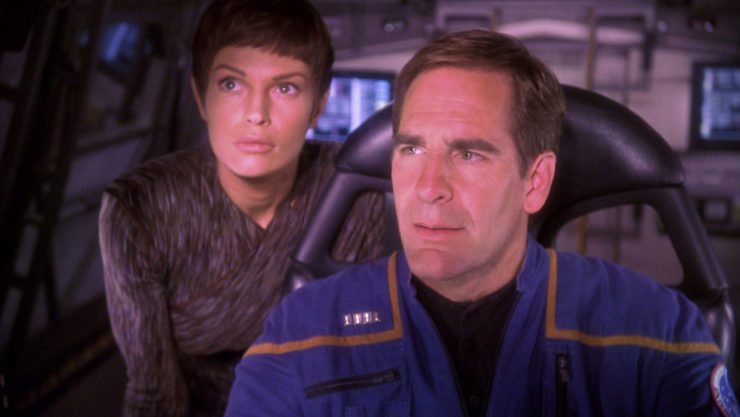
A fair summation of a middling season, though I remain on record as genuinely and un-ironically liking ‘A Night in Sickbay’.
A good way to sum things up. Season 2 of ENT was very much a breaking point for the franchise – thus leading us to the Xindi arc and a revamped show. Season 2’s early complacency is living proof of the law of diminishing returns. Rick Berman couldn’t keep things as they were indefinitely.
Besides standouts like Carbon Creek and Minefield, the first half of the season plods along, running on fumes. A Night in Sickbay being that bad, and being only the 5th episode of the season was a warning sign. You don’t get atrocious episodes this early in a production run – that’s usually reserved for the season’s back half (DS9’s Rules of Engagement or VOY’s Demon being the best examples). Of course we were headed to franchise lows like Precious Cargo sooner rather than later. This is the season that the TNG storytelling approach spearheaded by Michael Piller back in 1989 had hit its limit. The last truly episodic season of Trek until we get to Lower Decks, some 17 years later.
But in a way, losing that many viewers this fast was also a blessing in disguise. I still feel the season’s second half fares a bit better overall, as if the writers were adjusting on the fly, for the first time in years their job security less than guaranteed. Judgement, Cogenitor and Regeneration were some of Trek’s best efforts. Judgement being the best Klingon story since Gowron’s death on DS9. Cogenitor being the most daring incisive take on gender politics – similar to TNG’s The Outcast, but done right. And lastly, Regeneration – a tense chase story that single-handedly revived the Borg as a credible threat since VOY‘s Scorpion days.
It’s not a season I’m in any rush to get back to, but it’s a nice case study of a Trek show going through a painful period, undergoing some growing pains before we get the more evolved incarnation down the line. And the Xindi arc being the first real test in this transition, as Trek embraces a process of serialization that has since become the norm for the current era.
I think that this was probably the single worst season of Berman-era Trek; not really terrible, like TOS season 3, but like you said, just on the crummy side of mediocre without any reason to hope that it will get better.
I agree with the consensus — season 2 was unfocused, directionless, and just not very interesting. Season 1 had a loose arc of humanity proving itself as an interstellar presence, coming to a resolution in “Shockwave, Part 2.” Season 2 had no particular direction or theme, but just meandered.
@2/Eduardo: “The last truly episodic season of Trek until we get to Lower Decks“
Well, no, I wouldn’t say that. Season 4 was episodic; it’s just that it was mostly 2- or 3-part episodes.
@4/Christopher: But even those two/three parters dealt with major political events with long term consequences, whether it was the Vulcan revolution, the Augments crisis, the Klingon virus, the Andorian/Tellarite thread or the Terra Prime events. They don’t feel episodic, the exceptions being Bound and that transporter inventor episode.
Wasn’t first contact between Starfleet and the Tellarites made in this season, even if it’s just with the one individual bounty hunter?
Agreed that this was a very mediocre season of Trek much like Enterprise’s first season but there were several episodes that stand out and I think are fun or thought-provoking like “Minefield”, “Dead Stop”, “Regeneration”, and “Cogenitor.”
I remembered this was also the season that the producers were attempting to get William Shatner on the show in some capacity, and probably would have given the show at least a momentary ratings bump. Alas, the Shat proved too expensive to hire for his services.
@2./ Eduardo:
A good way to sum things up. Season 2 of ENT was very much a breaking point for the franchise – thus leading us to the Xindi arc and a revamped show. Season 2’s early complacency is living proof of the law of diminishing returns. Rick Berman couldn’t keep things as they were indefinitely.
Also factor in the box-office failure of Nemesis partway through this Season.
Combined, it was another sign of how the Berman-era stagnation was finally reaching its breaking point.
@5/Eduardo: “But even those two/three parters dealt with major political events with long term consequences, whether it was the Vulcan revolution, the Augments crisis, the Klingon virus, the Andorian/Tellarite thread or the Terra Prime events.”
And plenty of TNG and early DS9 episodes had major long-term consequences, but that didn’t mean the shows weren’t episodic. “Sins of the Fathers” led to “Reunion” led to “Redemption” and so on. “Q Who” led to “The Best of Both Worlds” led to “I, Borg” and so on. But the show was episodic, because those continuing arcs were not continuous.
People today constantly mistake continuity for serialization, or falsely assume that episodic and serial are mutually exclusive extremes rather than ingredients in the recipe. Having continuity does not mean a show isn’t episodic. A serial is something where every installment is a chapter in a single ongoing story. If there are multiple distinct stories, with different subject matters and clear beginnings and ends, then it’s episodic even if those stories connect to each other or have long-term consequences. The term “serial” refers to the structure of the narrative, not whether it has continuity.
“When I got this job, commanding the first Warp 5 ship was about as big as a responsibility as I could imagined. Then, we began running into so many…‘bad guys’, and I had to start thinking more about the safety of 83 people.”
It’s curious. I’ve always felt that Enterprise’s second season was the absolute pits. And maybe it is, but looking back over the last few months, I found it a more enjoyable experience than I expected. I found the alleged highs and lows a lot closer together than others did: I still find ‘A Night in Sickbay’ to be a perfectly fun and enjoyable episode (and remained astonished that, in a universe where ‘The ****ing Crossing’ exists, it could be regarded as the worst episode of the season, much less the series), while I still find ‘Judgement’ considerably overrated. ‘Cogenitor’ was less ‘The Outcast’ done right and more ‘The Outcast’ done exactly the same (resident alpha male womaniser decides to help oppressed minority by patronising her and making things ten times worse for her). Still, there were plenty of highlights, many of which have been, well, highlighted.
And…yeah, ongoing plotlines, not so much. We’ll get back to the Vulcan/Andorian plotline to good effect in Season 4 (and, to a lesser extent, Season 3), but this season was when they lost what little grip on the Temporal Cold Wat plot they had. On the plus side, we’ve got a decent story arc coming up which may not have saved either the show or the network but did save the sanity of everyone still watching!
STNG and B5 are both examples of shows that had uneven first seasons, but got better in their second season and beyond. This one stayed uneven through season 2. Say what you will about the Xindi arc, but at least it gave the show a consistent direction.
@10/AlanBrown: “This one stayed uneven through season 2.”
I’d say season 2 was more uneven than season 1. At least season 1, for all its uneven quality, had some unifying ideas and themes. At the start of season 2, it felt like some progress had been made since the start of season 1, in terms of the growth of the characters and storyline as well as the in-story progress the crew made. But season 2 just felt like it was marking time, and the finale didn’t feel like a culmination so much as a repudiation of what had come before.
I suppose that that’s why it felt so stagnant. Even on the later seasons of Voyager, there was at least some character movement; but here, excepting the last-minute upset in the final episode, everyone retains the exact same characterization throughout the season. I think that the lesson is that, whether your show is episodic or serialized, you can’t get away without character arcs anymore.
cap-mjb: I think it’s hilarious that you think they ever had a grip on the TCW storyline…. *chortlesnoot*
—Keith R.A. DeCandido
krad: Okay, maybe that’s giving them too much credit! But I do think that, in Season 1, even if they had no idea where they were going with it, there was at least the possibility that they might, at some point, go somewhere with it. Season 2 feels like the point where it spiralled completely out of control, to the point that there was no way of tying up all the loose ends they’d scattered.
@14/cap-mjb: It’s not that they had no idea what to do with the TCW so much as that they didn’t want to do anything with it. As I understand it, the idea was imposed on them by higher-ups at the network or studio, so they included it grudgingly and weren’t motivated to do much with it. So they put some token effort into it in season 1, put even more token effort into it briefly in season 2, ignored it for the rest of the season, tried to revamp it into a more focused time-travel arc in season 3, then just did one big crazy story wrap it up at the start of season 4 so they could finally be rid of the damn thing.
After all, by season 4, they knew were probably doomed anyway, so that’s the season where they stopped caring about appeasing the network or chasing ratings and just went wild doing whatever they wanted.
As much as I disagree with the direction this show took in season 3, I cannot deny that something had to be done to make the series feel more vital. The season overall feels so listless. It’s just more Trek, and without anything innovative to recommend it. That would be fine if the stories it told were very good, but that rarely happened. While this show is not my least favorite of the franchise, this season is one of my least favorite.
Something had to give. Viewed in isolation this show provided more Trek but not much else. Inconsequential is the keyword.
Taken in context season 2 of Enterprise was abysmal. This was the same year that Firefly grabbed audiences with a space cowboy spin, albeit briefly. Farscape had been providing weird aliens and strange storylines for a few years at this point. Stargate SG-1 was well established, providing more than just planet of the week stories by this point. Andromeda also existed and had a flavor of Rodenberry to it. (Reruns of TOS, TNG, DS9, and even VOY also provided competition, and it was always difficult for Enterprise to avoid accidentally retreading old paths.)
There was no shortage of genre and sci-fi shows either, vying for audiences attention of audiences. The likes of Alias, Smallville, Buffy, Angel, and others dominated the ratings, not to mention the rise and rise of cheaper reality TV and pop song contests. Ratings aren’t everything, but Enteprise wasn’t getting the ratings or managing to appeal to genre fans either.
I cannot help but wonder what the show might have been like if had been released direct to syndication, rather than being hobbled by the requirements of UPN, but it probably would have just had different problems and even less budget to work with. I can acknowledge the difficulty of knocking out a 26 episode long season but still be severely disappointed by the results. In hindsight the Temporal Cold War story arc only showed they didn’t know how to properly plan out a large story arc and it didn’t bode well for an even bigger story arc in season 3.
Onwards to season 3, which brings an even worse version of the theme song, some interesting aliens in the Xindi, some heavy-handed 911 analogies, and a even larger story arc that was at times slow and other times rushed, and ultimately didn’t really pay-off but at least it was different.
Thanks again to Keith for slogging his way through season 2 … it’s been a long road.
Season 2 of Enterprise, while overall not substantially worse than season 1 (which, to be clear, still makes it very bad) had some of the worst episodes overall of the entire series (and Star Trek as a whole). First off, there’s “A Night in Sickbay,” in which Captain “Trained Diplomat” Archer brings his DOG to a first contact (who immediately takes a piss on a sacred object because, to reiterate, he is a fucking dog), and immediately becomes angry (and even vaguely threatens them) when they dare to become outraged and demand an apology for his pet desecrating a religious object. Then there’s “Bounty,” an episode which solely exists to use Vulcan Pon’Far as an excuse to objectify and demean Jolene Blalock. And of course, “Carbon Creek” in which T’Pol’s ancestor takes umbrage at the thought of killing a deer to avoid starving to death but not at letting a group of sapient beings suffocate to death on the grounds that their lifespans are shorter than that of a Vulcan (also, for someone SO concerned with being discovered, she’s awfully quick to sell technology to some local huckster in order to help a bartender’s kid go to college). And, we would be remiss to forget about “First Flight,” in which we find out Archer hijacked a government spacecraft and was punished by being grounded for several months instead of shot for treason (as he should have been), demonstrating to the Vulcans (and viewers) that the Humans and Earth government of this era were either idiots or lunatics.
@19: “Archer hijacked a government spacecraft and was punished by being grounded for several months instead of shot for treason (as he should have been), demonstrating to the Vulcans (and viewers) that the Humans and Earth government of this era were either idiots or lunatics.”
I know I’m going to hate myself for saying this and maybe I’m standing on the edge of a huge case of Values Dissonance here but…you think a government who shoots someone for taking a joyride in a government vehicle is the one who isn’t made up of lunatics?
Because in the culture I was raised in, the very very most an offence that minor would deserve is a dishonourable discharge and a few months (yes, I said months) in the Starfleet equivalent of a military prison, and even that would be seen as a bit draconian.
@19/Santos: “Treason” is the wrong word. In order for an unauthorized launch of a spaceship to be treason, Archer would have had to do it on behalf of an enemy nation, or as part of a plot to overthrow Earth’s government.
“Hijacked” is also the wrong word, because hijacking means taking a vehicle by force or the threat of force against its owner or operator. This was simply an unauthorized use of a vehicle, which in the military would have a typical sentence of a month’s suspension without pay. If anything, being grounded for three whole months seems surprisingly harsh, particularly given that their flight was a success.
@19 and @20: Here’s the real sticking point. The vehicle he stole wasn’t like some random jeep that a staff sergeant had left the keys in it. That vehicle was, at that time, the single most expensive and advanced piece of technology ever developed in the history of the human race and their starfleet. Imagine if a technician or engineer on the Manhattan Project had broken into the Los Alamos lab and stolen a key component of the a-bomb prototype for some reason. That’s the kind of scale we are talking about. These are the kinds of things people sign many, many contracts, NDA’s and loyalty oaths to get even limited access to, most of which I assume include a clause where a breach of their agreement is considered an act of treason (i.e., the kind of thing they have firing squads for). Archer wasn’t some private who got drunk and went for a joyride in their division commander’s staff car. Stealing classified, experimental military technology like that would, in any sane military, mean at a minimum life in a stockade, if not summary execution after what I assume would be an extremely short trial.
@22/Santos: But Archer and Robinson didn’t “steal” the prototype. It’s not stealing if you bring it back. They were both authorized test pilots of the NX Beta; they just conducted an unscheduled test without approval. And they saved the program in doing so, so of course Starfleet showed leniency. It’s hardly rational to demand the most extreme punishment in every case without consideration of mitigating factors.
I mean, come on — nearly a century and a half later, Admiral Kirk and his crew will steal the Enterprise and get it destroyed. Do you think they should’ve all been executed for that? What about all the officers who’ve taken shuttlecraft without authorization? Should Tom Riker have been executed for stealing the Defiant?
I think you’re forgetting that they don’t have capital punishment in Trek’s future, because they’ve outgrown such barbarism. The only exception was violating General Order 7 by going to Talos IV, and even that was waived at the end of “The Menagerie.”
@23: The fact that they brought it back is not relevant. I keep returning to the Manhattan Project because it is the best metaphor I can think of for this. Even if a scientist or engineer had good intentions with stealing such a component (i.e., that had a theory they wanted to test to try and speed its development) because they thought the Trinity Test timeline was moving too slowly, unauthorized access of technology and equipment THAT important and dangerous (and classified) is universally unacceptable. Not just because of the risk of someone nefarious getting their hands on it, but because proper testing of highly advanced technology requires a VAST multitude of safety regulations and precautions. A vessel like that is a weapon of mass destruction just from sheer kinetic energy. Even flying at relativistic speeds, if it impacted something the released energy that resulted would be enough to crack continents. The fact that, by sheer dumb luck, it worked out does not change the fact that a) Archer demonstrated EXTREMELY poor judgement bordering on some kind of mental defect, and b) he 100% violated what I assume were DOZENS of agreements and documents which probably included a clause stating that violating them was an act of treason. Even IF they didn’t have capital punishment anymore, he should have spent the rest of his life in a military prison.
As to your other examples: as much as I hate to say it, Kirk probably should have at least been imprisoned for what he did (a punishment he knew was likely to result from his actions). I’m fairly certain the only reason they simply demoted him was because he saved the Earth from being exploded in Star Trek 4 (which, okay, fair enough on that one). And Thomas Riker was taken into custody by the Cardassians after that whole incident, rendering that argument irrelevant since we both know the Obsidian Order 100% executed him after a show trial.
@24/Santos: I don’t get why you’re fixating on Archer and ignoring the fact that A.G. Robinson was an equal partner in the act. I also don’t understand your eagerness to interpret everything in the worst possible way.
“he 100% violated what I assume were DOZENS of agreements and documents which probably included a clause stating that violating them was an act of treason.”
So your evidence for it being an act of treason is that it was “probably” defined as an act of treason. That’s pure circular reasoning.
@25: A) I focus on Archer because Robinson was dead by the time Enterprise takes place. Obviously, his ass (along with Tucker’s) should have both been in the cells next to Archer for the rest of their lives.
B) Yeah, I guess it is ridiculous to assume that they would continue that kind of procedure in the future (i.e., forcing people who want to access highly experimental, secret technology to sign NDA’s, loyalty oaths, and a variety of other contracts), just because literally EVERY government does it currently. I suppose them no longer carrying out one of the most obvious, common-sense precautions a government can take for expensive prototype technology (i.e., threatening and carrying out harsh punishments for unauthorized access of critical projects and equipment without any safety precautions) WOULD be consistent with my hypothesis that the United Earth Government and Starfleet of that era was governed by incompetent morons and lunatics. So, good point…I guess?
Just a reminder to keep comments/responses civil and avoid being rude or dismissive (see the full moderation policy here)–it might be time to agree to disagree on this particular point and move on.
Other thing I meant to say: There may have been several attempts to get William Shatner to make an appearance over the years, but I think the main one was for Season 4’s ‘In a Mirror Darkly’. (Which kind of makes sense, although I’d love to know the gymnastics they were planning to go through.)
I will take some blame or responsibility for the episode “Carbon Creek” having more comments than most. I just love that episode. In many ways it echoes the classic episode “City on the Edge of Forever” and it recaptures some of what I always loved about the original Star Trek. It stands alone, which is both a good thing and a bad thing.
That review was fun too, I especially appreciated Keith taking the writers to task for not bother to get their baseball right, and a simple economics lesson revealed a glaring plot hole.